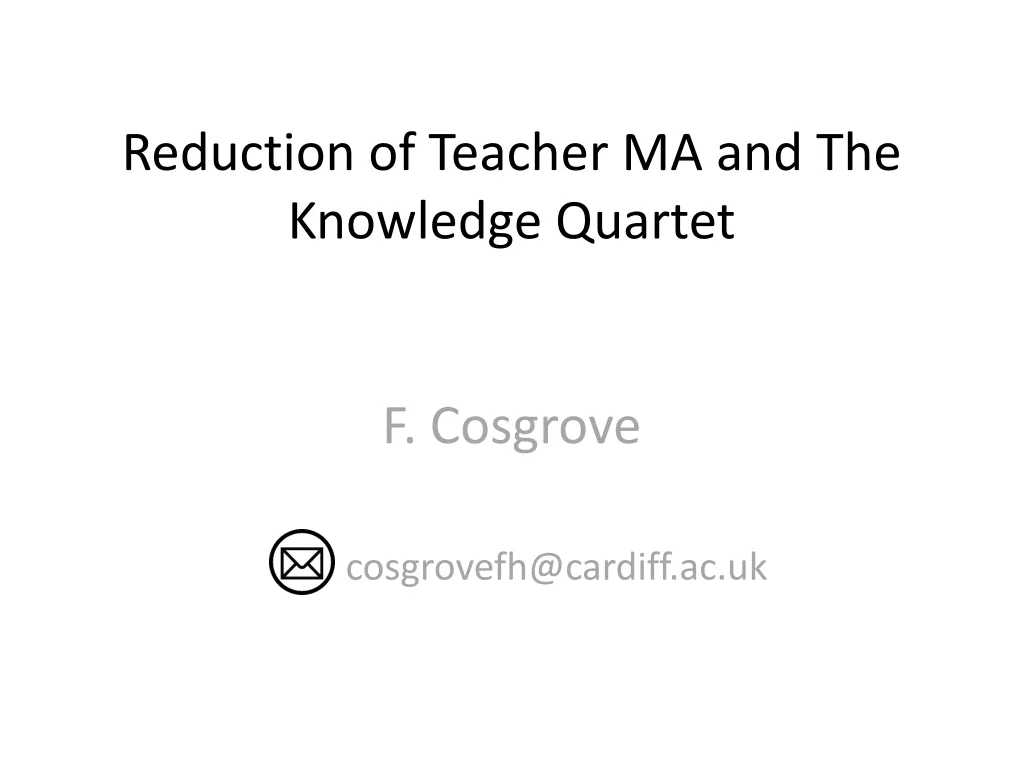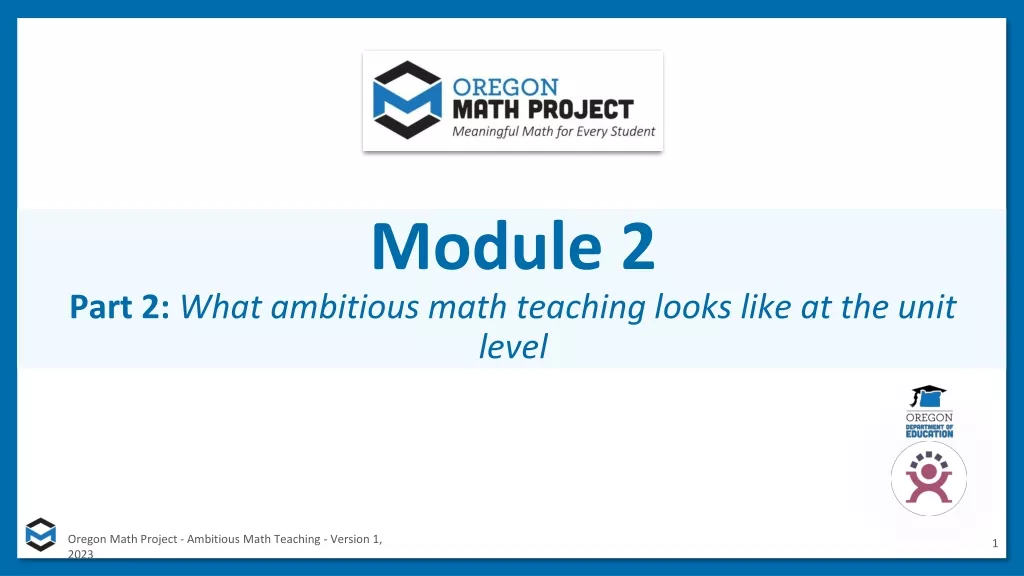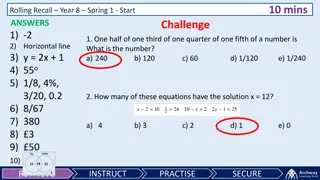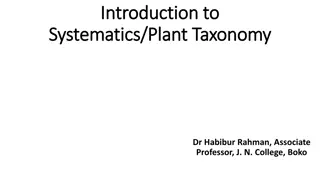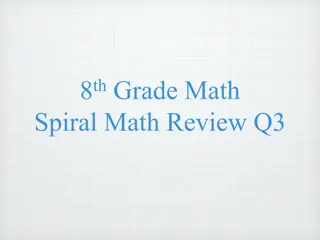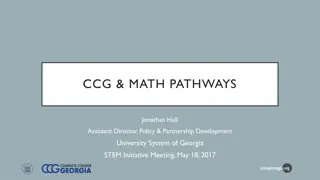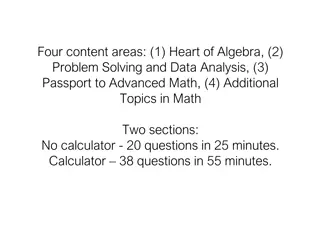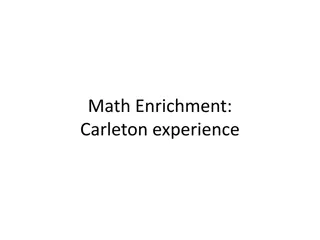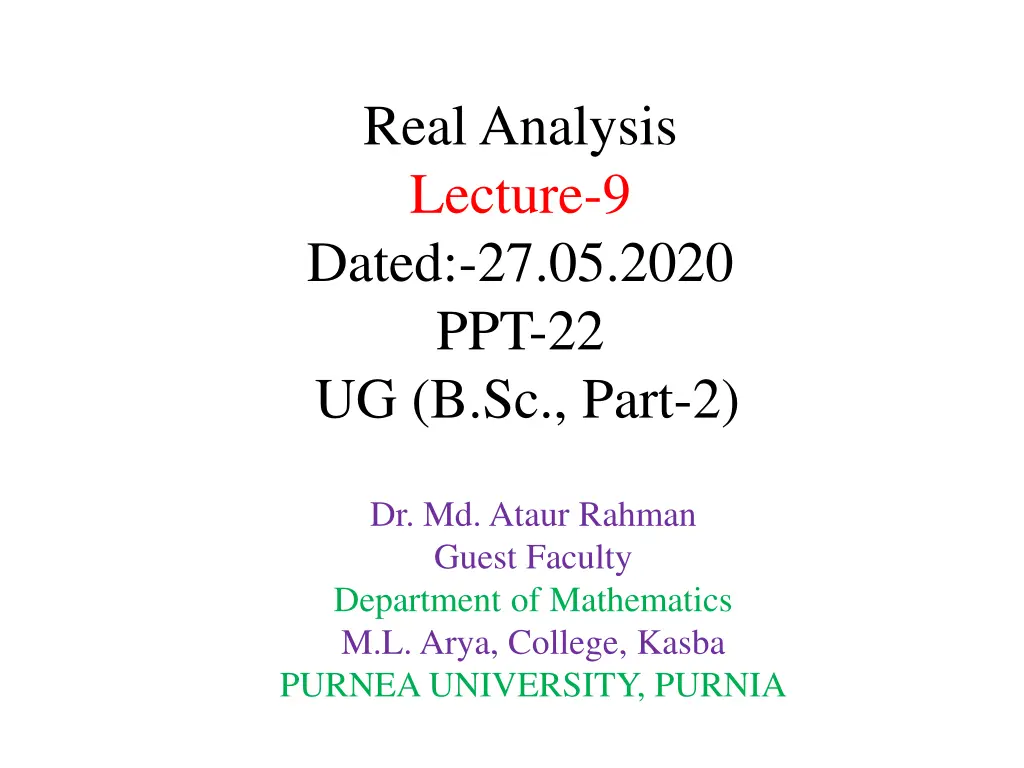
Real Analysis Lecture Problems and Solutions
Explore the solutions to convergent sequences and binomial theorems in Real Analysis lecture problems. Understand the proofs step by step for various mathematical concepts.
Download Presentation

Please find below an Image/Link to download the presentation.
The content on the website is provided AS IS for your information and personal use only. It may not be sold, licensed, or shared on other websites without obtaining consent from the author. If you encounter any issues during the download, it is possible that the publisher has removed the file from their server.
You are allowed to download the files provided on this website for personal or commercial use, subject to the condition that they are used lawfully. All files are the property of their respective owners.
The content on the website is provided AS IS for your information and personal use only. It may not be sold, licensed, or shared on other websites without obtaining consent from the author.
E N D
Presentation Transcript
Real Analysis Lecture-9 Dated:-27.05.2020 PPT-22 UG (B.Sc., Part-2) Dr. Md. Ataur Rahman Guest Faculty Department of Mathematics M.L. Arya, College, Kasba PURNEA UNIVERSITY, PURNIA
Problems 1 1. Prove that 2. Show that the sequence , where 1 1 1 1 2 3 n n n + + + = = n 1 . . lim n n a 1. n as n ie n n 1 n + l is convergent and = + + + a n n 1 2 its limit is l . where 3. Show that the sequence is convergent and 4. Prove that ( ( n 1. ( ) n 1 = + 1 a n n ( ) n 1 + = lim 1 n , 2 3. e where e n ) ( ) + 1 n n 1 1 + = + = ( ) lim 1 n ( )lim 1 n i e ii e + 1 n n ) n 2 + = 2 ( )lim 1 iii e n
Solution of (1) Let , then we have to prove that Let where L is very small positive quantity. 1 , L = + = lim n 1 a 1n = a n n n na 1 = + 1 n L n ( 1) ( 1)( 3! 2) n n n n n = + = + + + + 2 3 n (1 ) 1 n L nL L L 2! ( 1) 2 n n n 2 2 n L L 2! 2 n ( 1) 2 n n 2 L L ( 1) ( 1) n 2 lim n lim n lim n 0 ( ) L L negative ( 1) n . But L is a very small positive quantity So L = lim n 0 ( ) = + = + = lim n lim 1 n = 1 0 1 a L n 1 lim n 1 n proved n
Solution of (2) Given 1 + 1 + 1 + 1 + = + + + , a then n 1 1 + 2 1 + 3 1 + n n n n n 1 + = + + + a + 1 n 2 3 4 2 2 1 n n n n n 1 + 1 + 1 + 1 2 1 n 1 + = + + + + + + + 2 3 4 2 1 2 2 n n n n n 1 1 + = + , Now a a + 1 n n + + 2 1 2 2 1 n n 1 1 1 = = 0, n N + + + + 2 1 2( 1) (2 N 1)(2 2) n a a n n n 0, n a n N + 1 n n , a + 1 n n So, is monotonic increasing sequence. na
Continue Again 1 + 1 + 1 + 1 + = + + + a n 1 2 3 n n n n n 1 n 1 n 1 n 1 n 1 n + + + = = 1 n 1, ....(1) a n N n Also 1 + 1 + 1 + 1 + = + + + a n 1 2 3 n n n n n 1 + 1 + 1 + 1 + + + + n n n n n n n n 1 2 1 2 1 2 1 2 1 2 1 2 = + + + = = n n n n n n 1, 2 ....(2 ) a n N n 1 2 From (1) and (2), we get, Thus is monotonic increasing and bounded. So, is convergent and has unique limit say l . Hence 1 1, 2 1, n a n N n a n a l proved
Solution of (3) ( ) Given n 1 = + 1 ....(1) a n n By binomial theorem 2 3 1 n ( 1) 1 n ( 1)( 3! 2 n 2) 1 n n n n n n n = + + + + 1 a n 1! 1 2! 1 2! 2! 1 n 1 3! 1 n 1 1 = + + + + 1 1 1 1 3! 1 4! 1 n 1 1 + + + + + + ! ( ) n 1 1 1 2 1 2 1 2 1 2 1 n 1 1 + + + + + + = + 1 1 2 3 1 2 1 2 1 2 1 n = + = + 1 2 1 1 2 3 1 n 2 3, ... (2) . a n N n
Continue Also + e where 1 2! 1 n 1 3! 1 n = 2 n 1 n 1 1 = + + + + + 1 1 1 a n ! ( ) n 1 1 2! 1 n 1 3! 1 n 2 n lim 1 n 2 3 e n = + + + 2 1 1 1 1 n 2 n 3 n 2, ..( 1 0,1 0, 1 0, ) a n N as n . . 2 ie , ....(3) a n N n From (2) and (3), We get, Therefore, the sequence is bounded. Now, Thus is monotonic increasing and bounded sequence and hence it is convergent. And 2 3, n a n N n a 0, 0, a a a a n n N N + 1 n n + 1 n n n a



